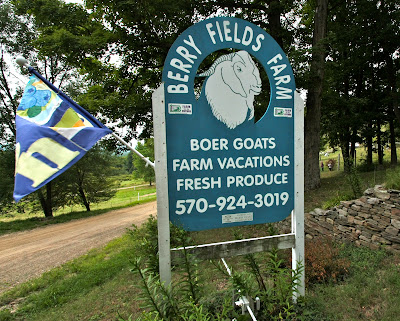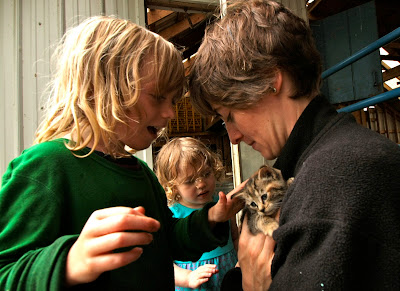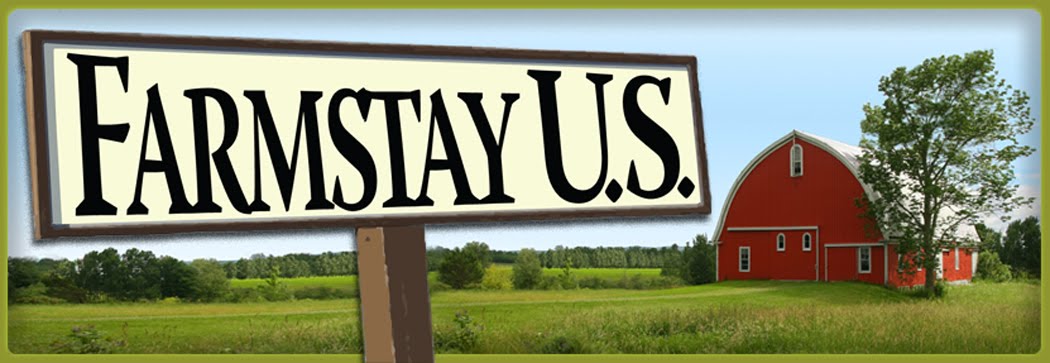Aunt Em's Urban Inn+Farm was the first urban farm stay I'd ever heard of. Needless to say, I was very excited to talk with innkeeper/farmer Emme Levine about what she does.
It turns out that there are a couple of other urban farm stays around the country. Very neat! More about those later. Of course, these places are very different than rural farm stays, but urban farm stays offer their own kind of farming education for guests who are fortunate enough to experience them.
Here's my interview with Emme.
Q: What came first, the inn or the urban farm?
Actually, I’ve always had a garden, even when I lived in New York City as a student I had a deck with cans of greens and even a tomato or two. This is our second house in San Francisco and one of our requirements was more land and south-facing. Land is hard to come by in such an urban setting, but we’ve been able to squeeze in a lot of crops into our 25 X 25 foot plot. I’m currently ripping out ornamentals and either donating or selling them off, replacing them with food crops to maximize the space we do have.
In the past few years, we’ve gotten so good at producing food, we always had extra. We started by just giving it away to food banks and neighbors.
Aunt Em’s Urban Inn was a brainchild of mine! I felt compelled to do something positive about our environmental situation. I had the physical space, so I started the Inn with the idea of educating the many tourists who flow through this great beautiful town of ours, San Francisco. I wouldn’t say I “sugar coat” the message, but maybe “salad coat” would be more apt. Once they taste the produce, they are total converts!
Guests have a chance to see how a green, organic, sustainable space works. The best part is it’s not huge – we are a micro farm and it’s the type of setup most working people could handle. They see the space, the setup, the compost bins, the recycling. They see us working the soil, weeding or picking fruit – enjoying it and eating well.
That’s really my message: Green is simple. It’s easy. Everyone can do it.
Q: What do you grow?
We do have fog, so we grow a variety of greens mostly. We also have a small orchard of fruit trees. We experiment with varieties – right now, we’ve got lots of seeds from France and Italy, which have similar climate conditions that we do – Mediterranean. We are actually in what you call the ‘Transition Zone” of weather in San Francisco: some fog, some sun, but sunny enough to grow say, cherry tomatoes, instead of the big ones I grew up with in New Jersey.
In addition to greens and fruit trees, we grow other crops seasonally – greens we grow year-round: kale, spinach, chard, bok choy, lettuce all do well. Spring and summer we do: cherry tomatoes, beans, pumpkins, squash. We also have a dabble of strawberries and blueberries. We just put in another apricot and also mulberry and loquat trees.
We don’t hesitate to rip out stuff that doesn’t work. I’ve had to get really vicious! I used to be such a wuss when it came to plants –they were like little lost pets. Now, I try to find them good homes, but if not, it’s the compost pile for them. I just took out a non-producing Brown Turkey Fig tree that was getting out of hand and never produced anything but raw, green figs. Yanked it!
Q: Is urban farming new to many of your guests? Do many of them want to become involved and get their hands dirty?
Yes, most guests who come to Aunt Em’s Urban Inn+Farm have never seen a farm – much less a compost pile! We have not actually had a dirt shoveling party yet – most guests are happy to help harvest, especially if they can walk out their back doors and “shop” for tasty salad greens or pick a ripe piece of fruit off our trees.
Q: How common are urban farms in San Francisco?
Right now, we are experiencing a complete renaissance in urban farming in San Francisco. There’s a real buzz around town, and it’s not just the bees! More people are jumping on the “hay wagon” and getting turned on to growing organic, sustainable food. That said, I can look out my back door and see only a few neighbors who grow veggies – a few more have fruit trees. Eventually, I’d love to set up a neighborhood collective – establish drop-off points to gather and sell surplus produce to locals.
Q: Anything else you'd like to mention?
My education of guests is pretty soft-sell. I “salad” bowl them over with lots of tastes. That really piques their interest and I’ve won more converts that way. Like the way to a man’s heart is through his stomach? Well, the stomach rules with green education. But really, it’s been an effort to get people to realize what the impact of local food systems can have on the environment. It’s all about using food to integrate larger concepts like sustainability and climate change awareness.
I ask my guests where their food comes from. They say: "Mexico, Chile, but usually not local." How does that food get to their table? Once they realize the answers, the head-scratching starts, the wagon wheels start turning and they are on their way.
I’ve had guests from Brazil, Switzerland, Ireland, Canada, Argentina and many US states who say they have NO composting or recycling programs where they live! They’ve all gone back with a little bit of knowledge and some motivation to make that happen. That really makes me feel good! I’m just one person, but I really CAN make a difference - I’m planting a seed in someone’s head and making a green revolution one lettuce leaf at a time.
To contact Emme:
Emme Levine
Innkeeper/Farmer
Aunt Em's Urban Inn+Farm
415.347.1367
www.emsinn.com
info@emsinn.com
Follow Emme onTwitter
It turns out that there are a couple of other urban farm stays around the country. Very neat! More about those later. Of course, these places are very different than rural farm stays, but urban farm stays offer their own kind of farming education for guests who are fortunate enough to experience them.
Here's my interview with Emme.
Q: What came first, the inn or the urban farm?
Actually, I’ve always had a garden, even when I lived in New York City as a student I had a deck with cans of greens and even a tomato or two. This is our second house in San Francisco and one of our requirements was more land and south-facing. Land is hard to come by in such an urban setting, but we’ve been able to squeeze in a lot of crops into our 25 X 25 foot plot. I’m currently ripping out ornamentals and either donating or selling them off, replacing them with food crops to maximize the space we do have.
In the past few years, we’ve gotten so good at producing food, we always had extra. We started by just giving it away to food banks and neighbors.
Aunt Em’s Urban Inn was a brainchild of mine! I felt compelled to do something positive about our environmental situation. I had the physical space, so I started the Inn with the idea of educating the many tourists who flow through this great beautiful town of ours, San Francisco. I wouldn’t say I “sugar coat” the message, but maybe “salad coat” would be more apt. Once they taste the produce, they are total converts!
Guests have a chance to see how a green, organic, sustainable space works. The best part is it’s not huge – we are a micro farm and it’s the type of setup most working people could handle. They see the space, the setup, the compost bins, the recycling. They see us working the soil, weeding or picking fruit – enjoying it and eating well.
That’s really my message: Green is simple. It’s easy. Everyone can do it.
Q: What do you grow?
We do have fog, so we grow a variety of greens mostly. We also have a small orchard of fruit trees. We experiment with varieties – right now, we’ve got lots of seeds from France and Italy, which have similar climate conditions that we do – Mediterranean. We are actually in what you call the ‘Transition Zone” of weather in San Francisco: some fog, some sun, but sunny enough to grow say, cherry tomatoes, instead of the big ones I grew up with in New Jersey.
In addition to greens and fruit trees, we grow other crops seasonally – greens we grow year-round: kale, spinach, chard, bok choy, lettuce all do well. Spring and summer we do: cherry tomatoes, beans, pumpkins, squash. We also have a dabble of strawberries and blueberries. We just put in another apricot and also mulberry and loquat trees.
We don’t hesitate to rip out stuff that doesn’t work. I’ve had to get really vicious! I used to be such a wuss when it came to plants –they were like little lost pets. Now, I try to find them good homes, but if not, it’s the compost pile for them. I just took out a non-producing Brown Turkey Fig tree that was getting out of hand and never produced anything but raw, green figs. Yanked it!
Q: Is urban farming new to many of your guests? Do many of them want to become involved and get their hands dirty?
Yes, most guests who come to Aunt Em’s Urban Inn+Farm have never seen a farm – much less a compost pile! We have not actually had a dirt shoveling party yet – most guests are happy to help harvest, especially if they can walk out their back doors and “shop” for tasty salad greens or pick a ripe piece of fruit off our trees.
Q: How common are urban farms in San Francisco?
Right now, we are experiencing a complete renaissance in urban farming in San Francisco. There’s a real buzz around town, and it’s not just the bees! More people are jumping on the “hay wagon” and getting turned on to growing organic, sustainable food. That said, I can look out my back door and see only a few neighbors who grow veggies – a few more have fruit trees. Eventually, I’d love to set up a neighborhood collective – establish drop-off points to gather and sell surplus produce to locals.
Q: Anything else you'd like to mention?
My education of guests is pretty soft-sell. I “salad” bowl them over with lots of tastes. That really piques their interest and I’ve won more converts that way. Like the way to a man’s heart is through his stomach? Well, the stomach rules with green education. But really, it’s been an effort to get people to realize what the impact of local food systems can have on the environment. It’s all about using food to integrate larger concepts like sustainability and climate change awareness.
I ask my guests where their food comes from. They say: "Mexico, Chile, but usually not local." How does that food get to their table? Once they realize the answers, the head-scratching starts, the wagon wheels start turning and they are on their way.
I’ve had guests from Brazil, Switzerland, Ireland, Canada, Argentina and many US states who say they have NO composting or recycling programs where they live! They’ve all gone back with a little bit of knowledge and some motivation to make that happen. That really makes me feel good! I’m just one person, but I really CAN make a difference - I’m planting a seed in someone’s head and making a green revolution one lettuce leaf at a time.
To contact Emme:
Emme Levine
Innkeeper/Farmer
Aunt Em's Urban Inn+Farm
415.347.1367
www.emsinn.com
info@emsinn.com
Follow Emme on




























.jpg)